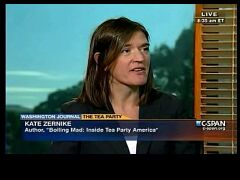Zernike Now Admits Coffee Party's Leftism, Sees Hope for Democrats in 2010
After ignoring the Tea Party movement for two months, it took the Times just one week to jump on the leftish "Coffee Party" in a report by Kate Zernike criticized by Times Watch and others for its gushing tone and for failing to identify the new group as a left-wing opponent of the Tea Party protesters.
By contrast, a follow up by Zernike on the front-page of the Sunday Week in Review made sure to quickly label the Coffee Party as "a leftish alternative to the Tea Party movement."
But then there's the headline over her story: "Democrats Need a Rally Monkey." Who says the Democrats "need" anything? Does the Times have a rooting interest in Democrat success?
"Wake Up and Stand Up." So urges the bold motto of a seedling movement calling itself the Coffee Party, a leftish alternative to the Tea Party movement.
But it's going to take more than a jolt of java, which so far amounts to not much more than a wishful exhortation, to energize the left. The buzz and the intensity for some months now have been on the right, led by Tea Partiers as they've zealously and methodically marched with plans for what Sarah Palin called "another revolution" come the fall elections.
For Democrats paralyzed by their "party of no" counterparts and dissension in their own ranks - and more recently, pecked by scandal - the currents look much as they did for Republicans in the summer of 2006 or Democrats in the fall of 1994, when a swelling tide swept the other party into power.
What would it take to get back the intensity Democrats had just a year ago?
Some say it can't be done.
"When a party's snakebit, it's really snakebit," said Charlie Cook, the independent political handicapper, who is predicting a thumpin' for Democrats in November. "That happened to the Republicans in 2006 and to a certain extent in 2008, and it's true of Democrats now."
Like reporter Adam Nagourney before him, Zernike glided right past Obama's plummeting job approval and favorability numbers in a New York Times/CBS News poll taken last month to oddly suggest "the public is already on the president's side." Zernike interspersed bleak views of Democratic prospects with a thin and unconvincing rebuttal suggesting Republicans may have equal troubles convincing voters in November, ignoring the large drop in Obama's approval and favorability ratings since last year:
Polls suggest that the public is already on the president's side. In a New York Times/CBS News survey early last month, respondents were twice as likely to say that President Obama was trying to work with Republicans as they were to say that Republicans were trying to work with President Obama (62 percent versus 29 percent). And by overwhelming margins, they said they wanted both sides to compromise some positions "in order to get things done.
Zernike implied that rancorous primaries, while bad for Republicans, could be good for Democrats:
This is where the Tea Party's role in the primaries is so crucial for Democrats. Do Tea Partiers push the Republicans to nominate conservatives who can't win in the general election? In the Senate races, Mr. Cook said, this could mean choosing Rand Paul over Trey Grayson in Kentucky; John Hostettler over Dan Coats in Indiana; or Ovide Lamontagne over Kelly Ayotte in New Hampshire.
"If they nominate a whack job, their odds go way down," [political analyst Charlie] Cook said of Republicans.
To rev up their own voters, the Democrats' best hope might just be that very intensity on the other side.
"The rhetoric from the right is so over the top, I think it does have the ability to create a reaction on the Democratic side," Mr. Greenberg said.
Zernike stated as fact an old liberal excuse: That the right wing is better at public relations, at selling the public on its ideology:
According to that script, there will come a day when Ms. Palin asks, "How's that hopey changey thing workin' out for ya?" and Democrats feel strong enough to stand up and yell, "Just fine, thanks!" But therein lies another problem. Just what is the snappy retort to the kind of taunt Ms. Palin tosses at wary Democrats like so many upside-down horseshoes? The left has never been as good as the right when it comes to messaging. "Wake up and stand up"? It's not bad, but it's no "death panel."
....
There are other things Democrats can do to energize the base. Bringing up immigration reform, Mr. Alter says, tends to draw Hispanic voters on their behalf. Pushing the Employee Free Choice Act could rally labor. Republicans campaign against it as "card check," but their voters don't tend to go to the polls on it.
And even rancorous primaries - like the ones for Senate in Colorado and Arkansas challenging the incumbents Michael Bennet and Blanche Lincoln - can stoke voters (just ask the Democrats who came out in record numbers in 2008 - if you can stir them).
Zernike even managed to spin Scott Browns's shocking Senate victory in Mass. as a warning sign for the G.O.P.:
As President Obama himself noted, the energy that got him elected helped elect a Republican, Scott Brown, to a Massachusetts Senate seat held by a Kennedy for nearly 50 years. "That same energy could knock out a lot of Republican incumbents who are doing cartwheels down K Street right now thinking that they are safe," Mr. Trippi said.
In polls, Americans show more frustration with Republicans than Democrats. In the New York Times/CBS poll last month, 51 percent said they view the Democrats unfavorably, the highest since November 1994, when the Republicans swept into office. But 57 percent said they view the Republicans the same way, near the all-time high of 60 percent.



